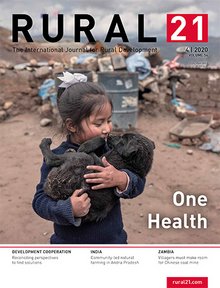Vol. 54 No. 4/2020: One Health

Against the backdrop of current developments surrounding COVID-19, the “One Health” approach is gaining momentum. It is based on the insight that zoonoses, i.e. diseases that can be transmitted from animals to humans, can be predicted, prevented and controlled much more quickly and at a lesser cost than if the two disciplines are working separately. But the One Health concept also implies that human and animal health are intrinsically linked to the health of our environment. In other words, it is a comprehensive approach that reaches way beyond tackling infectious diseases.
Our authors give accounts of how the One Health concept evolved; how it has since further developed and in which contexts it can be applied; what we know about interrelations at the animal-human-environment interface – and what we (still) don’t know; how One Health research, capacity building and implementation intermesh; and why we should consider food systems in this context. And – last but not least – how we can use the approach to counter future pandemics.
Focus
- One Health – towards a more inclusive science
- Countering the double-whammy of zoonotic diseases
- COVID-19 research – what really matters
- Adopting the One Health approach in international practice
- From research to implementation strategies – One Health Capacity Building
- An interdisciplinary centre of excellence for pastoralists in the Horn of Africa
- Towards better livelihoods of livestock-keeping communities
- Focusing on infectious diseases is not enough
- "We have to prepare for the unexpected"
- How can we make the livestock sector more resilient?
- One Health and wildlife trade(-offs) – preventing future pandemics
- Uniting One Health and food systems for a more sustainable and inclusive world



